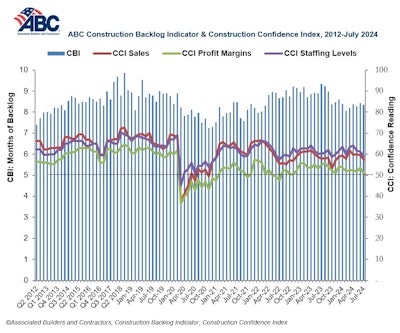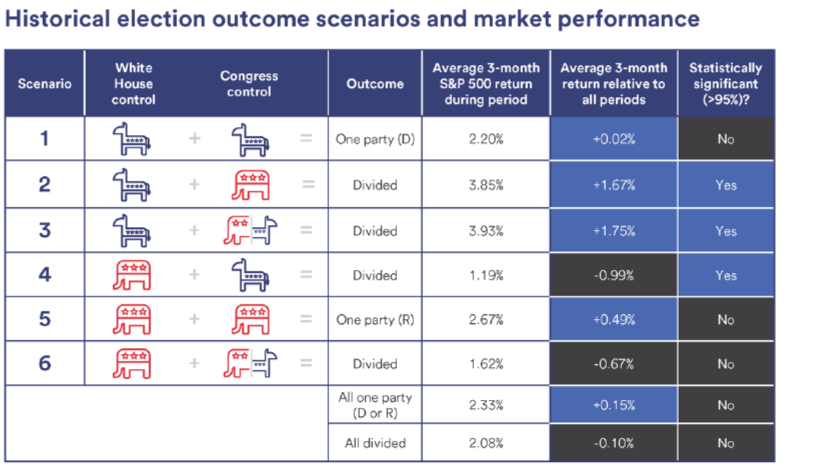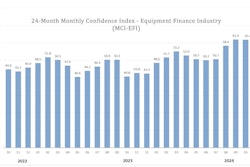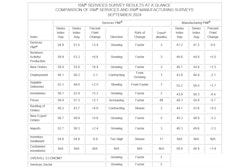
TV news shows and videos are full of opinions and predictions about the fate of the U.S. economy. Turn on many of these programs and one might think the sky is falling. Many of those shows will likely be bellowing this week about slight, 0.0X changes in pricing and backlog changes for the past month.
It's great theater to scare businesses into thinking the economy is crashing. Inflations rates have surely slowed some investments; this much is true. Moving into September, it's anxiety-inducing to think about whether the Fed Reserve will cut rates at its mid-September meeting. Will it the Fed's cut be enough?
Per usual, in a divisive election year, many manufacturers and business have decided to hold off on making purchases or investments until they learn the results of the U.S. presidential election. With recent unexpected events, such as a change in the likely Democratic Party's candidate for president and former President Donald Trump's failed assassination attempt, there is a lot to be uneasy about these days.
Depending on who is elected, taxes might increase and national investments in various sectors may change. There are many reasons to be nervous. It's important to keep in mind, though, that many economic indicators have remained baseline and above average, such as the latest economic indicators reported by the Institute for Supply Management's Services Report on Business released last week, which reported modest but warming economic trends for July.
Rob Haworth, senior investment strategy director at U.S. Bank Wealth Management, in this article, shared some valuable insights about how the presidential election might impact economic sectors.
“It’s still too early for investors to game out exactly how tax issues will play out over the election season,” said Haworth.
He also said party control may have more impact at the sector level.
“For example, if Republicans win, there is likely to be more of a push for development of fossil fuels, while a Democratic win might further promote renewable energy development," Hayworth said in the article.
Yet Haworth said such policy tendencies don’t always translate into investment outcomes.
“Ironically, businesses tied to renewable energy saw their stocks perform better under the Trump administration, while stocks of oil companies and other traditional energy companies have performed better under the Biden administration,” he added.
U.S. Bank reported that presidential elections often have little impact on financial markets. There are a few scenarios, however, that U.S. Bank data has found to be statistically significant:
Two scenarios corresponded to positive absolute returns in excess of long-term average returns:
- Democratic control of the White House and full Republican control of Congress.
- Democratic control of the White House and split party control of the Senate and House.
One scenario corresponded to positive absolute returns modestly below long-term average:
- Republican control of the White House and full Democratic control of Congress.
Today, the Associated Builders and Contractors (ABC), which has endorsed Trump for president, put out two reports based on new federal numbers that work as economic indicators for the construction industry. The reports showed lukewarm progress for the year for contractors, as well as a slight price increase for raw materials used in building.
The U.S. Labor Department released its Producer Price Index today, which ABC uses in its reports.
 Construction Confidence Index.Associated Builders and Contractors
Construction Confidence Index.Associated Builders and Contractors
ABC's Construction Backlog Indicator held steady at 8.4 months in July, according to an ABC member survey conducted July 22 to Aug. 6. The reading is down 0.9 months from July 2023.
 Construction Backlog Indicator.Associated Builders and Contractors
Construction Backlog Indicator.Associated Builders and Contractors
Download an Excel spreadsheet of the full Construction Backlog Indicator and Construction Confidence Index data series here.
Only the largest contractors, those with greater than $100 million in annual revenues, have longer backlog than one year ago, ABC reported. On a monthly basis, the decline in backlog was driven by declines among the smallest contractors, those with less than $50 million in annual revenue.
ABC’s Construction Confidence Index readings for sales, profit margins and staffing levels fell somewhat in July. All three readings remain above the threshold of 50, indicating expectations for growth over the next six months.
“Contractor confidence regarding profit margins now stands at the lowest level since November 2022, which comes as little surprise," said ABC Chief Economist Anirban Basu. “There are now strong indications that elevated interest rates have finally taken their toll on a number of privately financed construction segments as well as the broader economy."
Basu continued:
“While inflation has moderated in recent months, construction materials prices remain almost 40% above pre-pandemic levels,” said Basu. “With construction spending down for the past two months, the industry eagerly awaits lower interest rates. Given recent economic turmoil, the Federal Reserve will begin cutting rates at its September meeting.”
Despite the gloom and doom, Basu recently reported optimism for the construction industry in the 2024 Marcum National Construction Survey. Basu was less dire in that report:
"While it’s mostly good news for the construction sector and the broader economy, it is wise to emphasize the cautious in that cautious optimism," Basu said in the report.
Within the report, Joseph Natarelli, Marcum's national construction industry leader, said, "Our survey reveals that despite the challenges facing the construction industry, the overall outlook remains positive. It was surprising to see how many construction companies and contractors leave money on the table by not utilizing valuable tax incentives and programs. I encourage leaders to explore those opportunities and those created by new technological advances to future-proof their business and brace for potential changes in the outlook."
 U.S. Bank Asset Management Group
U.S. Bank Asset Management Group
How various economic factors will play out in coming months and how those factors will be impacted by Fed Rate changes and the election remain to be seen. So far, economic indicator changes month to month have been miniscule. Taking a big picture view of the economy, however, no matter the results of these decisions, the sky is not falling. The U.S. economy is incredibly resilient and there are many indicators pointing to optimism. While it's easy to become wrapped up in daily news reports (that often offer little actual news), it's important to maintain prudence and patience before jumping to conclusions.




















